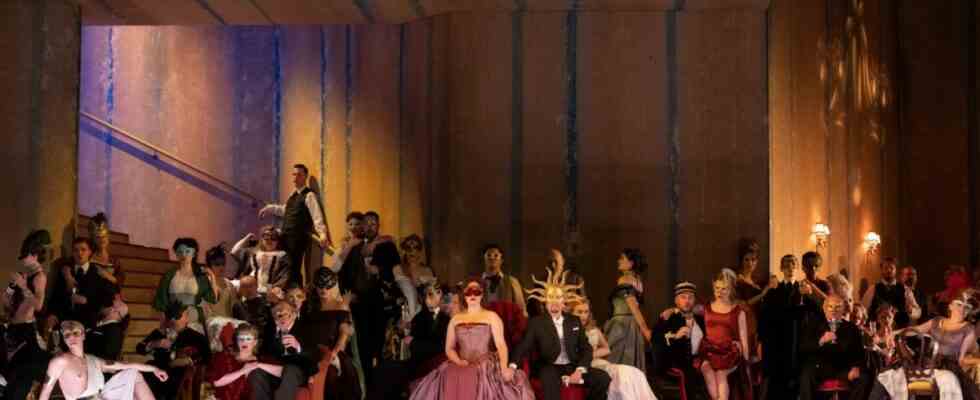Finally, the lover and prisoner Hermann lies murdered in front of the long and dreary table of a drunken hobby gambler gang, his rival contemptuously turns the corpse over with his foot, the choir fervently sings a prayer. Is it the end of a player or a lover too big? The strange relationship between money and love has always fascinated opera composers. It starts with Claudio Monteverdi’s “Poppea”, where the equation money=power applies to Wolfgang A. Mozart’s “Figaro”, determines Giuseppe Verdi’s “Traviata” as well as Richard Wagner’s “Ring”, reaches its climax in Pyotr Tchaikovsky’s last great The opera “Pique Dame”, which is so grandiose because the great poet Alexander Puschkin’s template, which ingeniously mixes Shakespeare with gothic romance, social analysis and love psychology, inspired the composer to create music that condenses in archaic inescapability, as well as folklore, Mozart parody, church music and bel canto knows how pathos, horror, colportage, depth psychology and romantic fragility.
In Baden-Baden’s Festspielhaus, conductor Kirill Petrenko and his Berlin Philharmonic meticulously attend to each of these moments. The fanning out of volumes, delays and timbres brings the score close to Gustav Mahler’s tonal fiddling, who not only showed himself to be an enthusiastic follower of Tchaikovsky in his ninth symphony. Petrenko gives the score a breath, he brings it to life like a golem, he makes everything strange, bizarre and exaggerated understandable without levelling, trivializing or detoxifying it. Petrenko combines this abundance of details and modern sound thinking with an orgy of sound effortlessly whipped up from the quietest of webs, with a raging passion, with a lust for long-spun cantilenas, dark abysses of sound. Here everything is there. And almost incidentally he carries his singer and the fabulous Slovak Philharmonic Choir on his hands.
Arsen Soghomonyan sings the loser Hermann with a lyrical, colorful tenor, powerful, but always threatened with failure
No wonder that the audience, the house is not completely full, celebrates Petrenko and the Philharmonic stormily. The last two Easter Festivals in Baden-Baden fell victim to the plague, and now major operas can be performed again for the first time. Intendant Benedikt Stampa took over the house shortly before the epidemic. Now he beams overjoyed in his short speech and also says: “We heard Tchaikovsky before Putin existed.” While many other orchestras and houses took Russian pieces from their programmes, the Festspielhaus and the Philharmonic were unimpressed. A concert with Anna Netrebko, who is close to Putin, was canceled and the Ukrainian ambassador in Germany refused to attend a Ukraine solidarity concert by the Philharmonic with Federal President Frank-Walter Steinmeier because only Russian soloists performed there. But these are isolated cases. Russian music is indispensable not only at the Baden-Baden Easter Festival. No orchestra in the world can and wants to do without Stravinsky, Tchaikovsky, Prokofiev, Mussorgsky, Rachmaninoff or Gubaidulina, because their pieces are an integral part of the repertoire that attracts the public.
Gradually, her amour fou with Hermann (Arsen Soghomonyan as Schatten) has become a threat to Lisa (Elena Stikhina).
(Photo: Monika Rittershaus/Festspielhaus Baden-Baden)
Arsen Soghomonyan sings the loser Hermann with a lyrical, colorful tenor, powerful, but always threatened with failure, sometimes brooding, sometimes breaking out, all at play with his lusts and delusions. He loves Lisa, who gives up everything for her great love Hermann: marriage, wealth and security: Elena Stikhina gives this rebellious modern woman down-to-earth and directly as a matter of course. But Hermann drifts off into madness, in the end he has three murders on his conscience. Arsen Soghomonyan compellingly shows the fall of an unfortunate man into instability and insanity, Petrenko and his family fuel this decline with music that knows about the despair and fears of those who are excluded. Unfortunately, the directing team Moshe Leiser / Patrice Caurier is hardly interested in the abysses of this opera. They play in a brothel with vaudeville-like impartiality, provoke a few boos with a gay scene (Tchaikovsky was gay) and leave the psychological depth to the singers, musicians and Petrenko.

